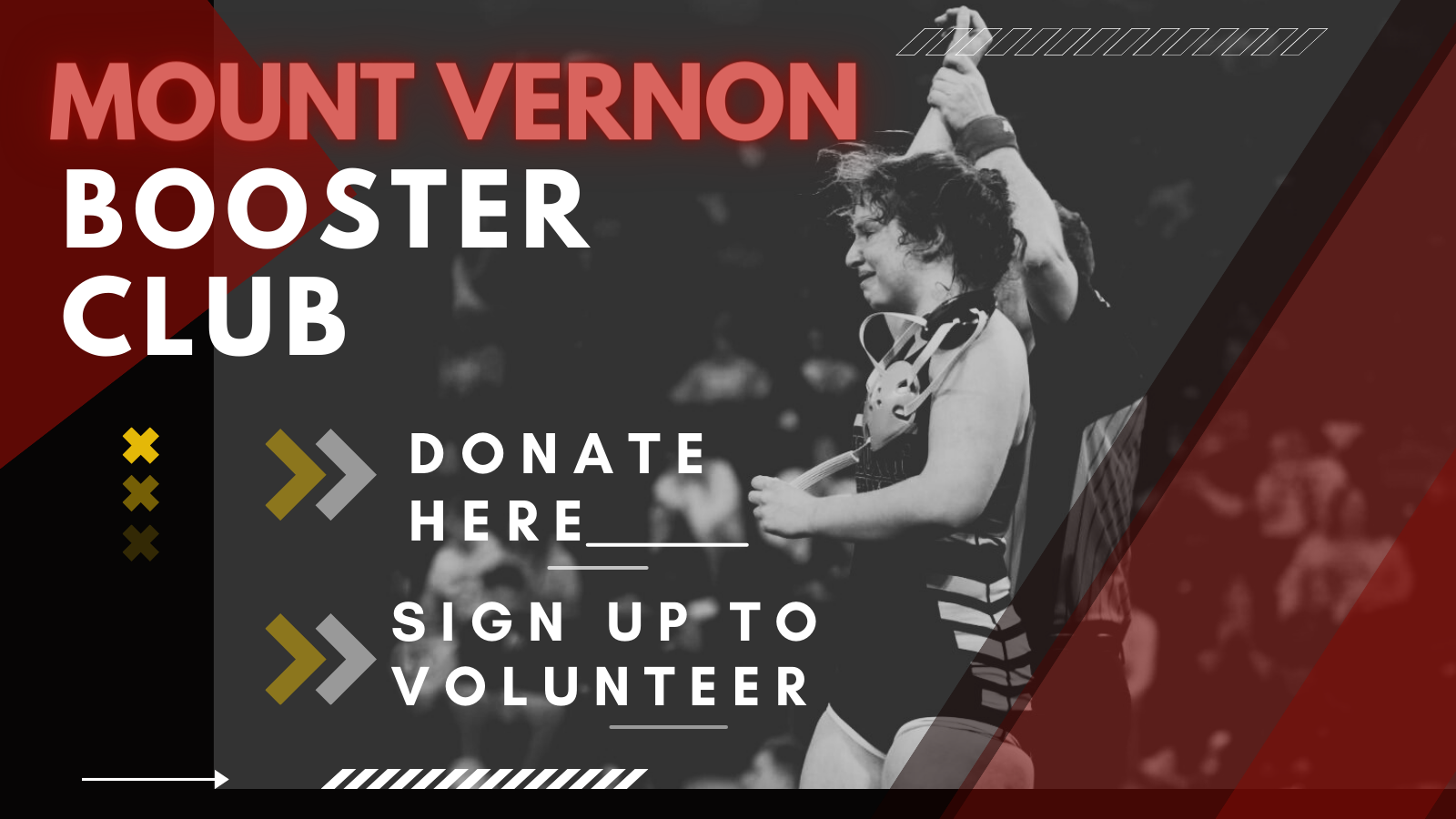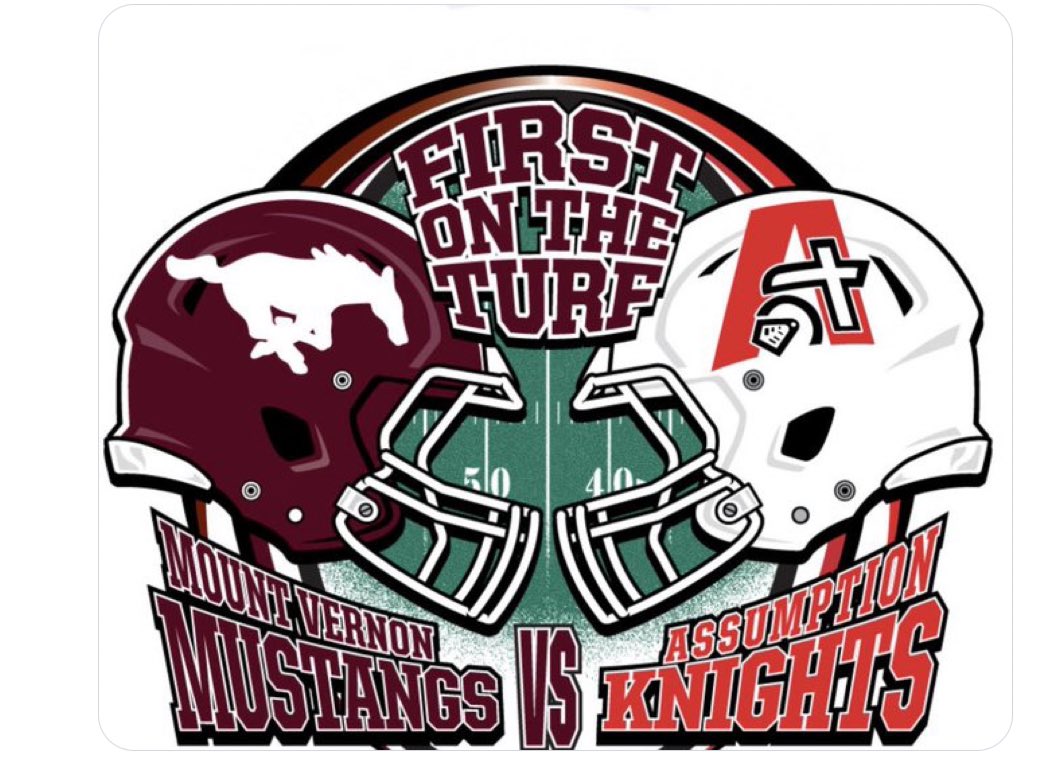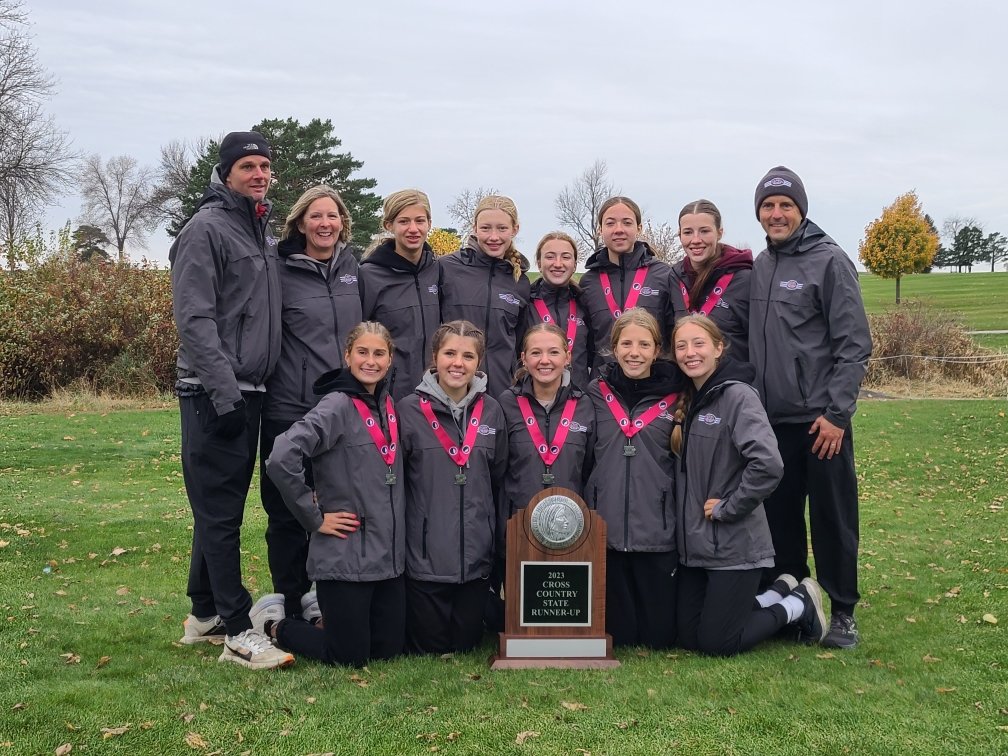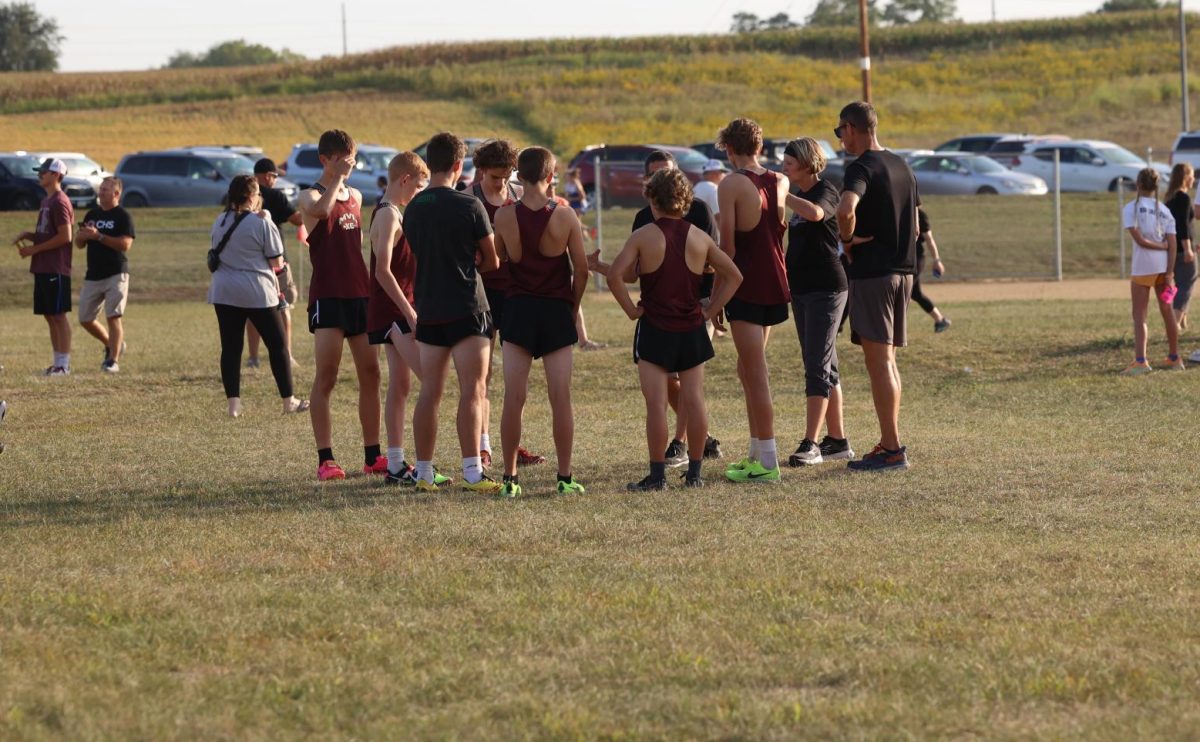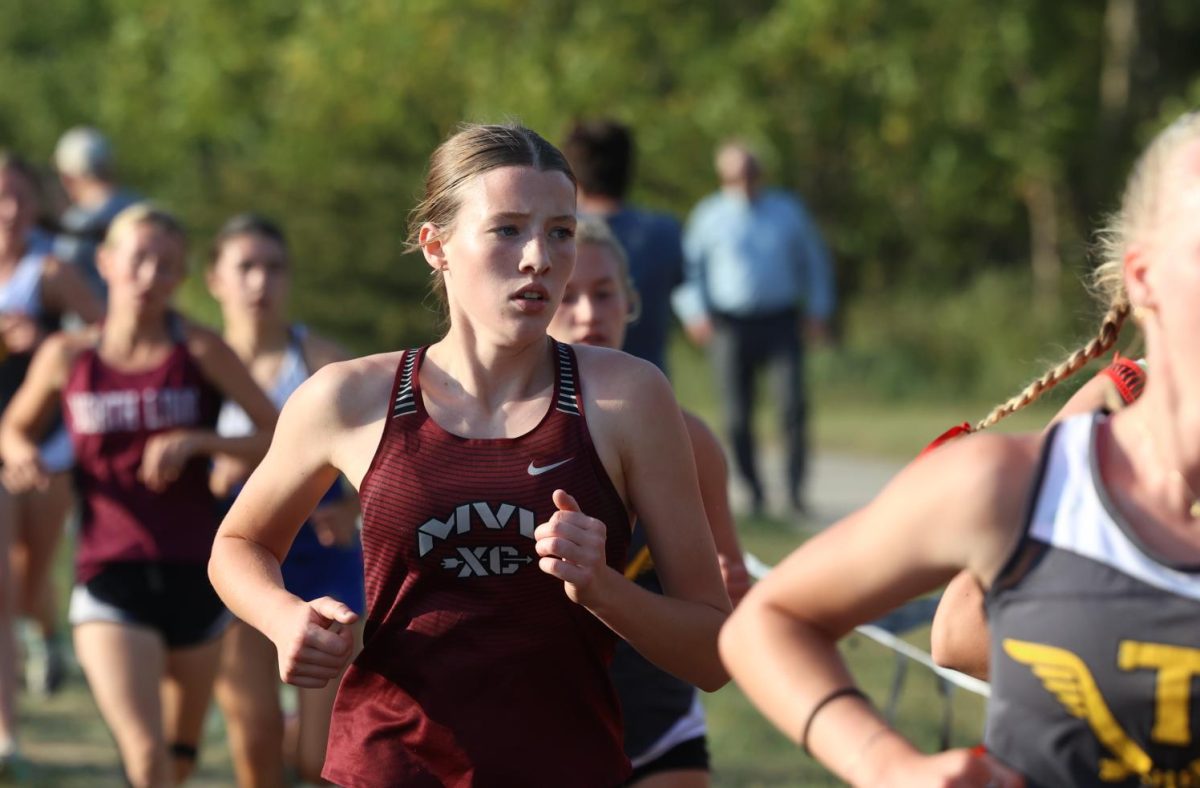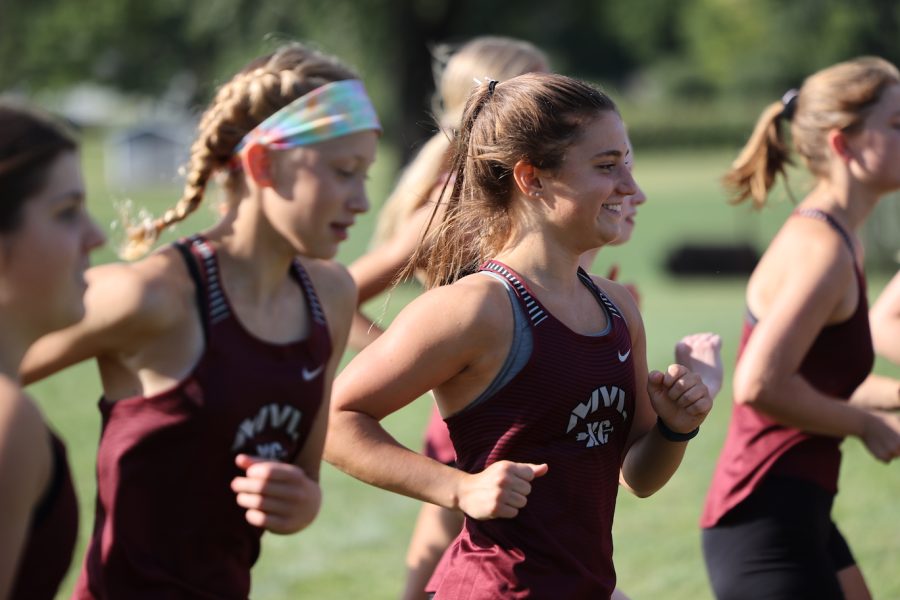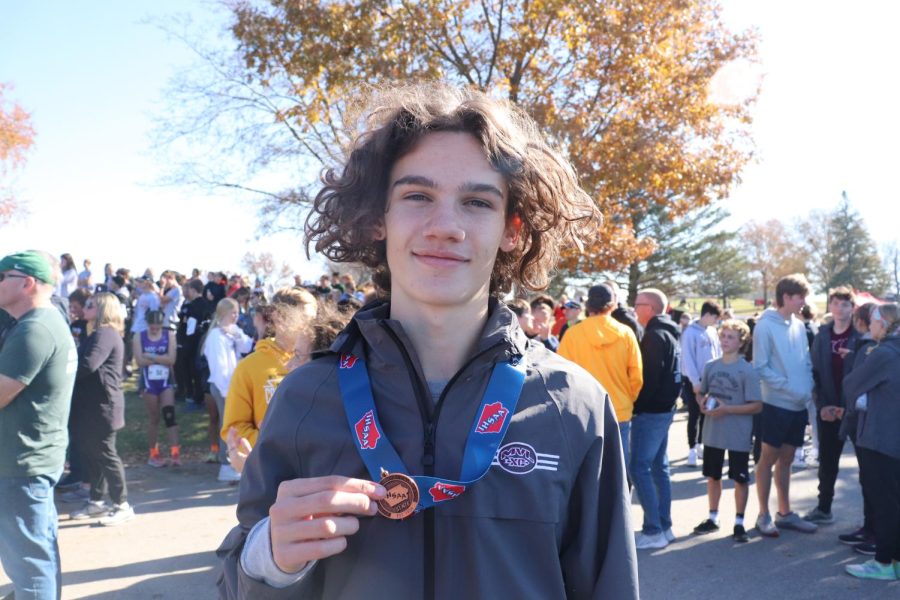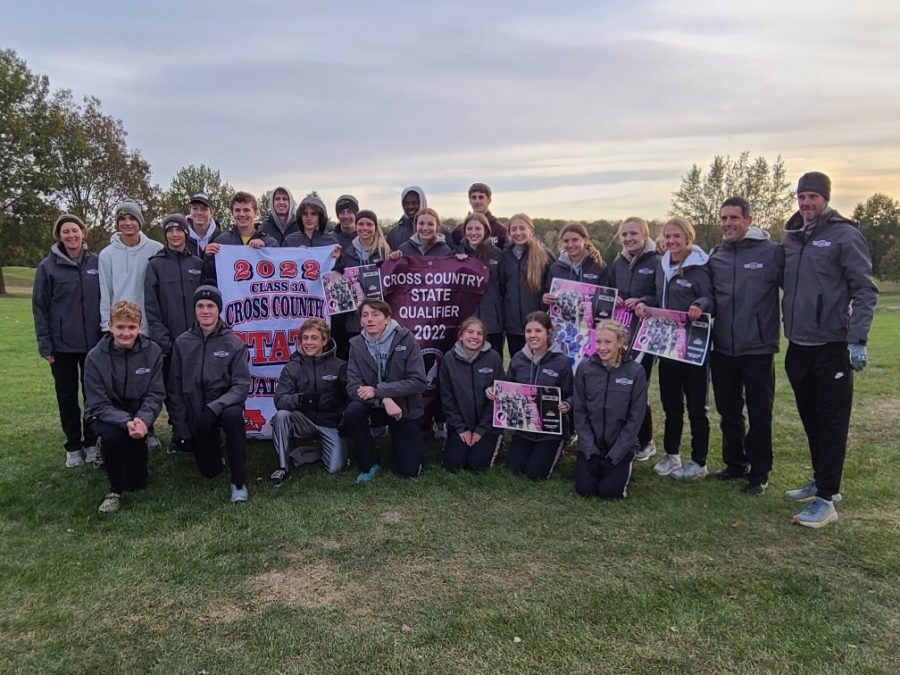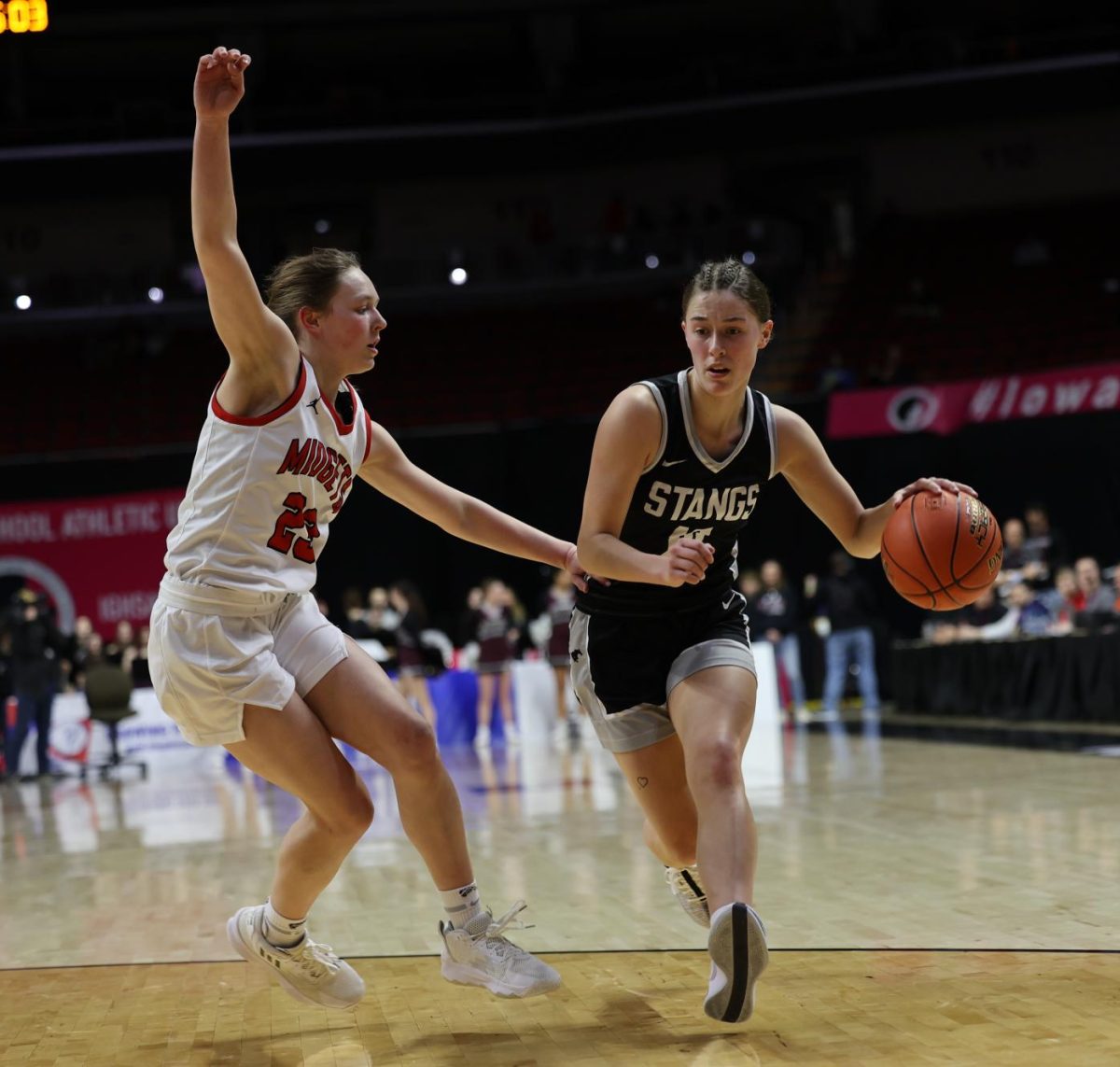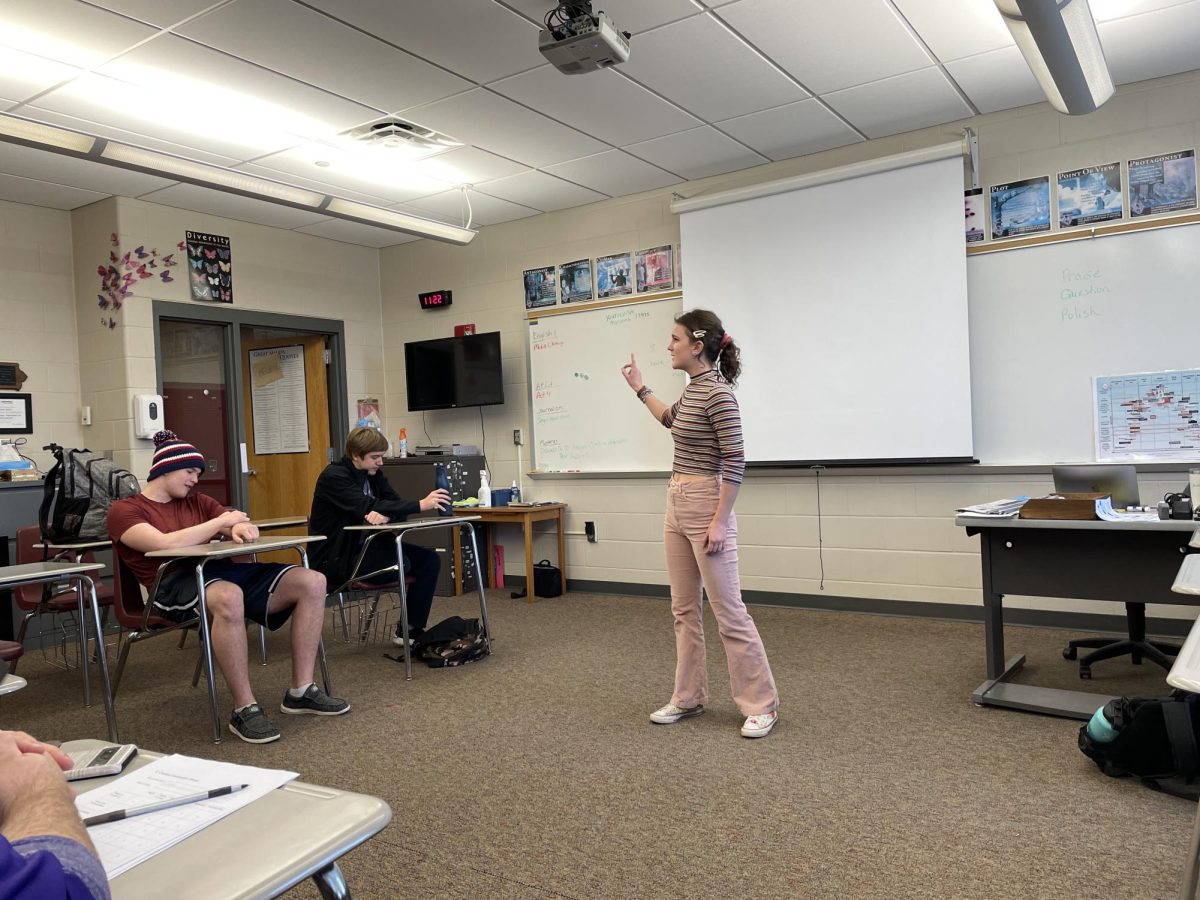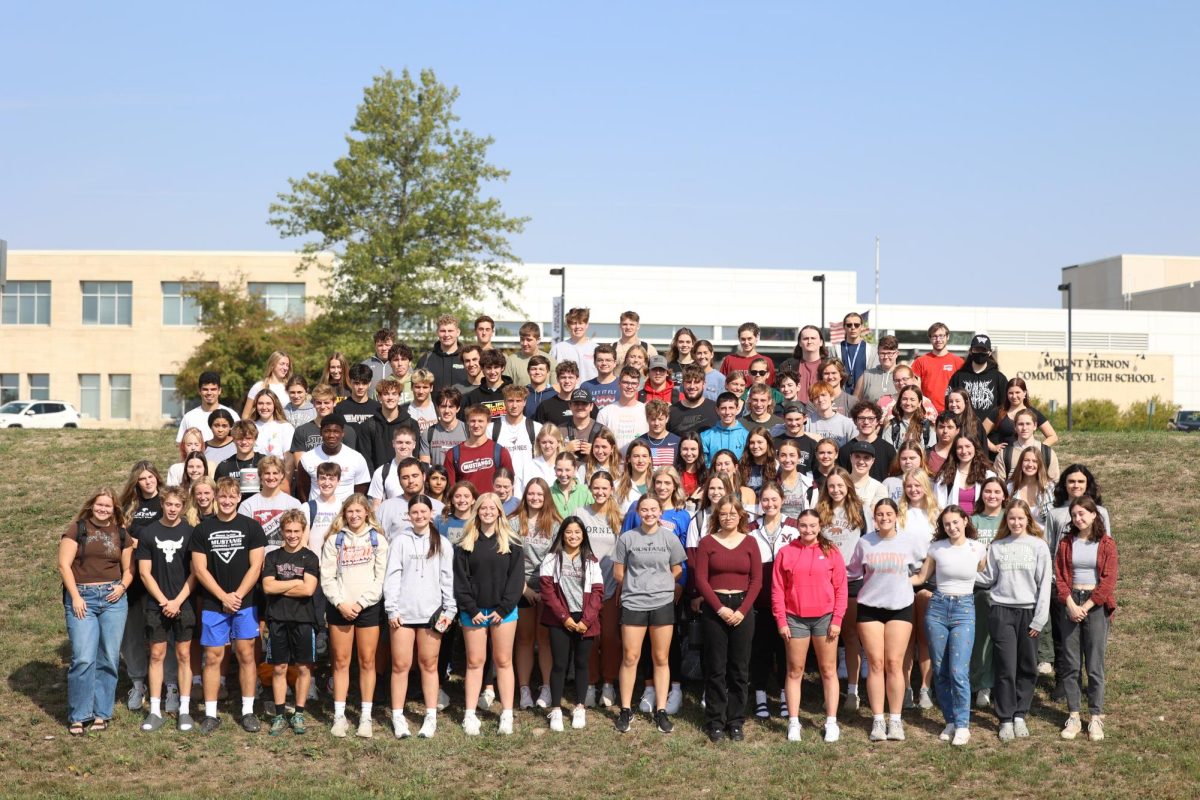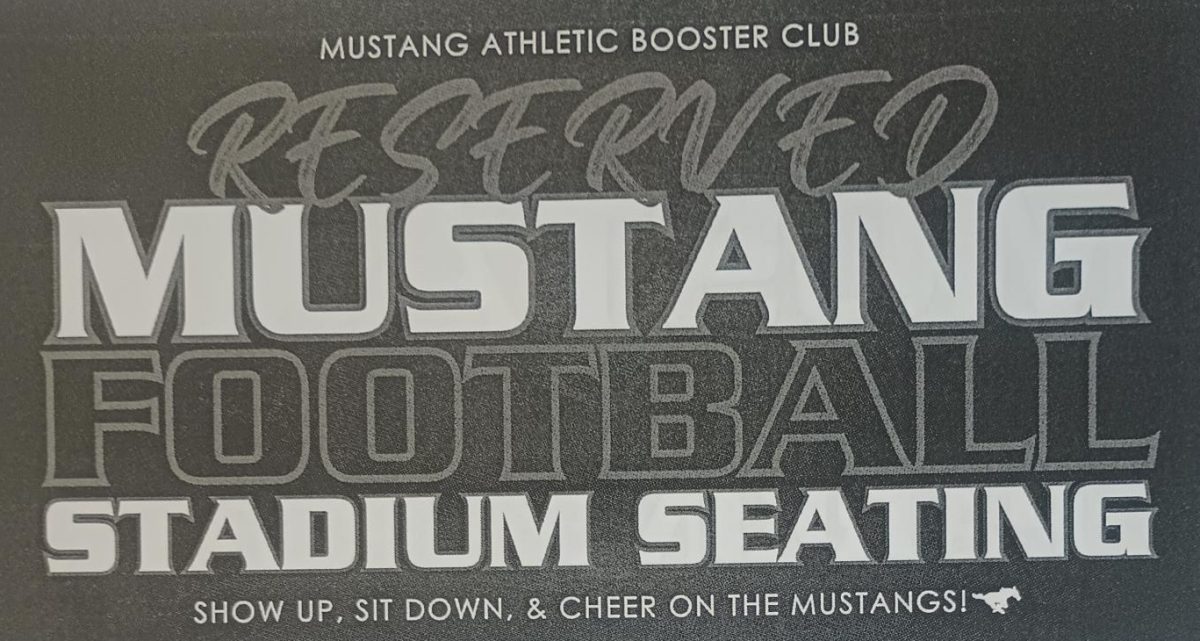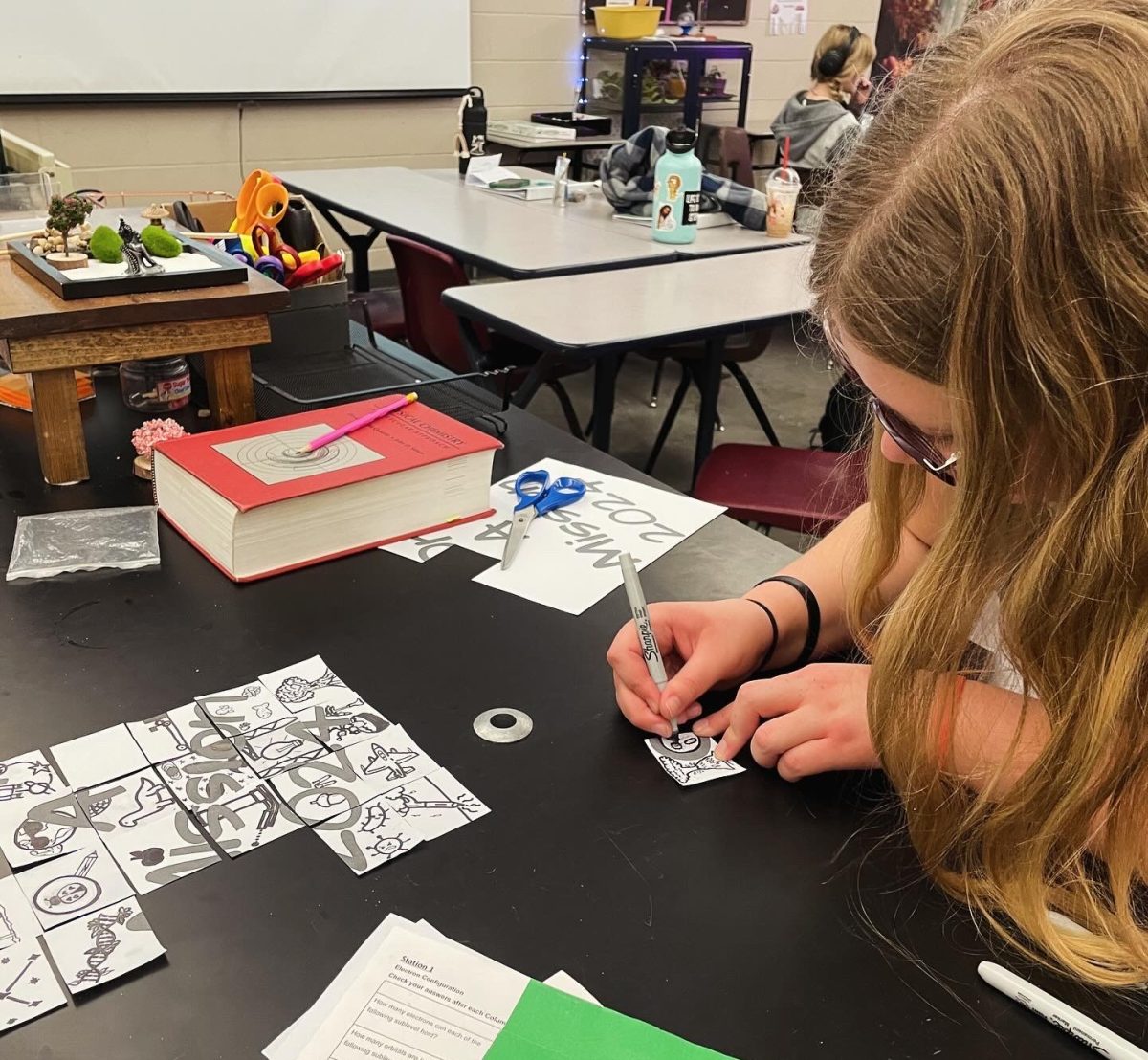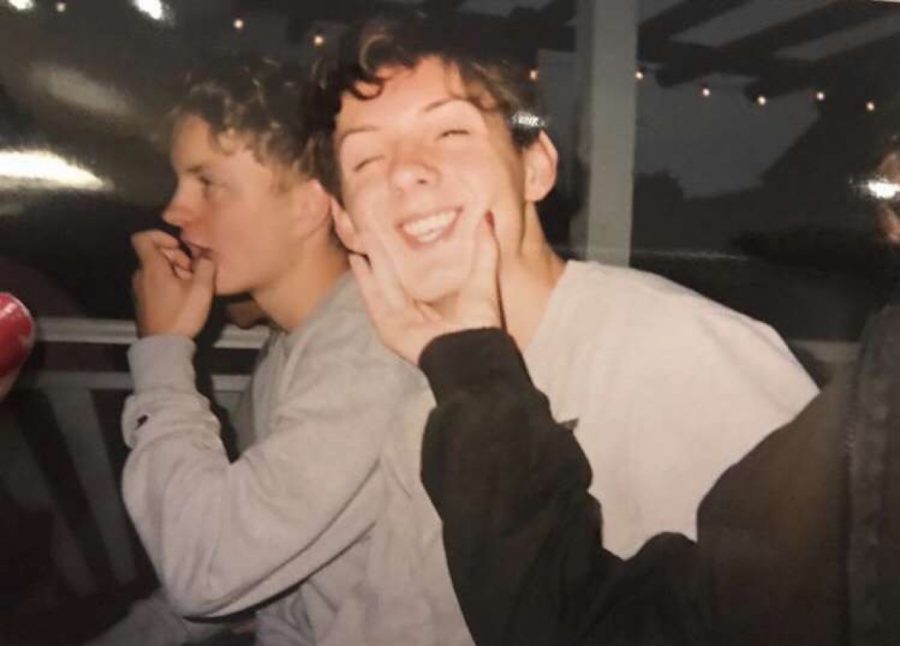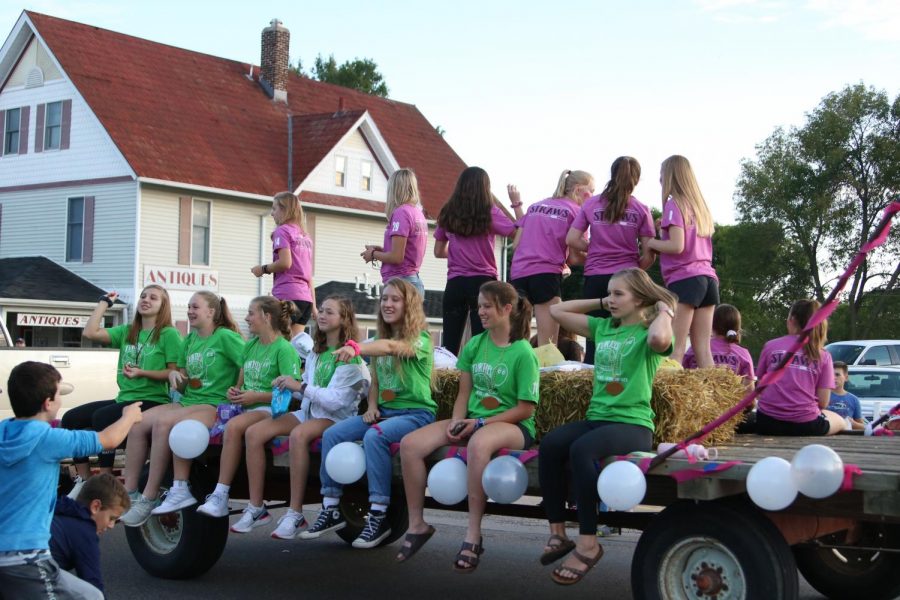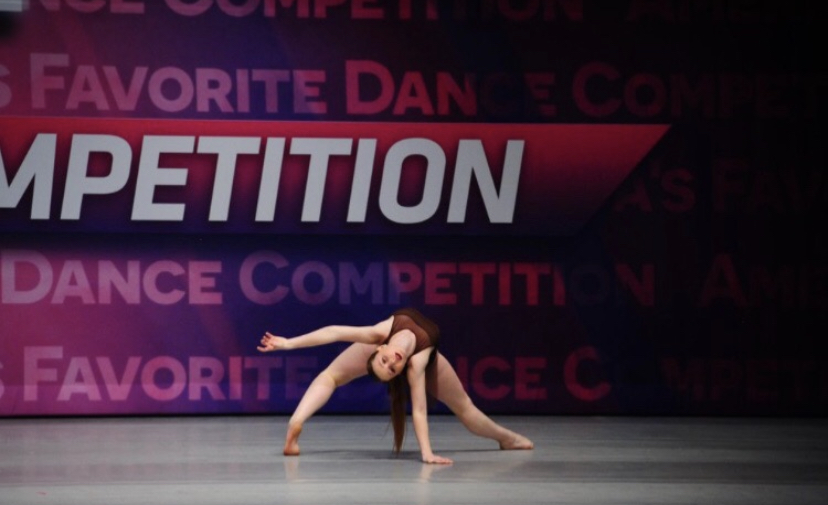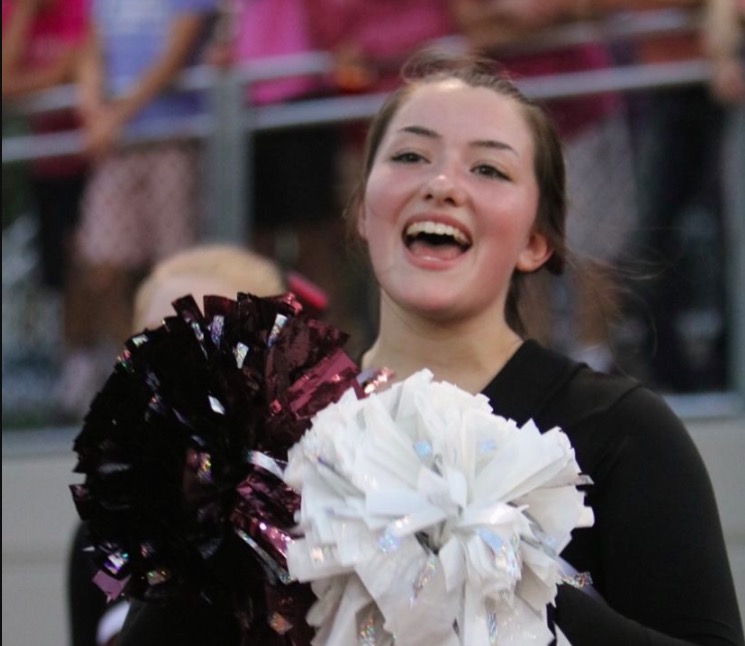Cross country runner overcomes challenges on path to state competition
Download this story as a PDF version for easier reading: In Pursuit of the Dream by Jack Young
By Jack Young
The mid-fall sunshine beats down on 75 high schoolers loitering in front of Mount Vernon High School. It’s just a few minutes before 3:45, and all of them are dressed for cross country practice.
They’re standing in groups, together a consolidated team of boys and girls from both Mount Vernon and Lisbon high schools. They chatter lively about anything and everything. Their conversations are loud and frenetic as the school day draws to a close and practice begins.
Coaches Sue Deibner and Kory Swart pedal up to the front on their bikes. Swart has planned an easy run for his team today, 22.5 minutes out on a gravel road north of Mount Vernon, and 22.5 minutes back. No one is counting distance, but the plan for the top runners on the team is to make it 3 miles before having to turn around, about a 7:30 mile pace. Easy as pie.
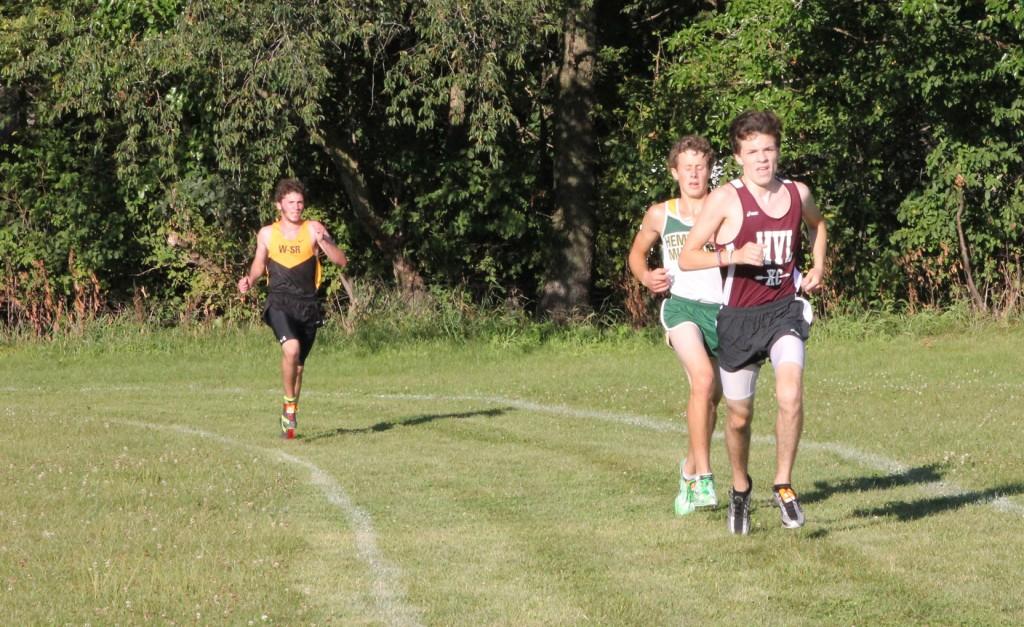
“Let’s get going,” Swart yells.
The crowd begins to surge forward.
Out of the melee of runners, senior Ben Gilbert appears and strides to the front of the herd. He belongs at the front. Gilbert has consistently been the second best runner on the team this season. He’s clothed in plain black basketball shorts and an old wrestling shirt that drapes over his thin figure. He leads the 75-strong team up a slight hill and to their first turn.
***
The run had just begun, but Gilbert’s journey is more than three years old. It began his first day of high school cross country practice. He was a scrawny, unathletic freshman who had run a little bit in middle school but with absolutely no seriousness. That first day of high school cross country practice, he saw the top runners on the team — Connor Smock and Will Teubel, both future NCAA Division I runners. Their unbelievable pace and breathtaking form blew Gilbert away. The dramatic spike in the competitive level between middle school and high school seemed insurmountable. Suddenly, that middle school conference meet medal he had won last spring seemed like a pathetic trinket.
His first high school meet was at Mount Vernon on the school campus. As soon as the gun went off, the words “welcome to high school sports” flashed vibrantly across Gilbert’s mind. He finished the race with a 23:21, nearly seven and a half minutes behind the winner. Gilbert had lost. He was just a slow freshman on one of the top teams in the state. His vague hopes and dreams of high school running stardom were over.
***
As they run farther and farther from the school, the runners begin to spread out. The seven varsity and a few of the top JV runners group up while the rest of the team drops farther and farther back. Someone in the lead group cracks a joke. Gilbert laughs. If anyone fits the description of an All-American boy, it’s Ben Gilbert. A drum major, Student Council representative and Eagle Scout, he possesses a likable demeanor and easy smile that makes him popular among classmates and teachers alike.
Next to Gilbert, a JV runner jokes about placing in the Top 10 at the Wamac Conference meet in a few weeks, a seemingly unattainable goal.
“You could be like Ben his freshman year,” a teammate quips. The whole group chuckles. Gilbert adds under his breath, “Yeah, freshman year was crazy.”
***
Luckily for Gilbert, another teammate shared his seemingly impossible dream of success. In practice, Gilbert got to know another freshman named Ethan Brand, who was the same age and just a little bit faster. Gilbert wanted to beat him. He didn’t care about his time or place — he just wanted to beat Brand.
His competitive spark caught fire. Every practice he would try to stick with Brand for as long as possible. It would always end with Brand pulling away at the end leaving Gilbert feeling defeated. So Gilbert started going up to the weight room after practice with the varsity runners.
“A little bit of something extra” was what he liked to call it. The next five or six meets Brand beat him handily, but Gilbert finished a little bit closer each time.
Both Brand and Gilbert improved so much that they were catching up to the varsity runners’ times at meets. At the Iowa City West meet that October, Gilbert and Brand went head-to-head. Gilbert passed him in the first 100 meters and didn’t see him for the rest of the race. He had beaten his rival and for the first time in two months, his competitive hunger was fed.
That was just a nibble, however. At the next meet, at West Delaware, Gilbert ran hard with two teammates by his side. He ran hard enough to pull away from them and win the JV meet. His time — 18:35 — was a five-and-a-half minute improvement from his first meet just six weeks earlier. Even three years later, Gilbert looks back on that race as his best in his high school career.
It was the moment he realized just how much talent he had. Not only that, it was the moment he made the jump from being an up-and-coming freshman to being a talented high school cross country runner.
Gilbert still wasn’t satisfied. He took aim at getting one of the two alternate spots on the squad heading to the state meet in Fort Dodge. He wanted to be part of this incredibly talented varsity squad that was winning every meet.
Thankfully, his coach wanted him there, too.
The varsity squad welcomed Gilbert as one of their own for the state-qualifying and state meet. He cheered from the sidelines at the state meet at Fort Dodge as Mount Vernon-Lisbon placed fourth. Watching the runners go by at the state meet, Gilbert made a supreme goal. Considering how much he had improved in just two months, it wasn’t an entirely unrealistic goal.
Gilbert wanted to be the greatest runner the state of Iowa had ever seen, and he wanted the glory and the gold medals and everything that came with it.
***
They run up a hill and cross Main Street, beginning a long downhill stretch. The runners are constantly talking to each other. It’s a diversion during the grueling practice regimen the team endures. The discussion bounces from politics to girls to religion to the events of the school day.
***
Three months later, track season rolled around. Gilbert knew he wanted to run, he just had no idea what he events he should run. His coach, Ryan Whitman, didn’t really know where to put him, either.
Three juniors — Thomas Bernard, James Wenzel, and Nate Marti — took Gilbert under their wing. They taught him how to race and stay mentally strong, ran with him at practices, and encouraged him at meets. It was everything that Gilbert needed as an inexperienced freshman.
Whitman started him at the 1,600-meter run. The first meet, he started strong and kept right behind Bernard, Wenzel and Marti. On the final lap, he passed and beat all three of them. The student was beating his mentors.
Then he was moved to the middle distance events — the 800 meter and 400 meter run. He ran a couple JV relays, but couldn’t beat his personal best of 2:13 in the 800. So for the last two or three meets, Gilbert ran the 3,200 — at eight laps, the longest race on the track.
The first time he ran it, Gilbert knew it was his race. He ran a 10:43, an exceptional time for his first race. Right after that race, he hopped in his car with his parents and drove 72 hours to Washington D.C. for his brother’s wedding.
Gilbert was gone for a week. He couldn’t find a place to run in D.C., so he didn’t. He lost a lot in just that one week. He lost so much that when he came back, he couldn’t beat that 10:43 at the conference meet or the state qualifying meet. In fact, he started too fast at the district meet, panicked and ran an awful race. He didn’t qualify for the state meet.
***
The conversation turns to shoes, a common topic among the squad. Gilbert wears white Mizunos with red trim. They’re stained dark brown by 500 miles of trails and roads. He needs to get new ones, but he carries a special attachment to his Mizunos. They’ve been with him every step of the way.
As the lead group reaches city limits, the pavement turns to gravel. They’ve reached the two mile mark and are deep into the countryside. The corn and bean fields on either side of the road have already yellowed, a prelude to the turning of leaves on the trees that will happen in about a week. The gravel crackles beneath Gilbert’s every step, a sparkly percussion in contrast to the dull thump his shoes make hitting asphalt. Away from the hubbub of the city, the beat provides a strong, even tempo for the soundtrack of this run.
***
Despite not qualifying for the state meet, Gilbert entered that summer between his freshman and sophomore year anticipating the fall cross country season. Three seniors had graduated from the varsity squad and he knew if he put in the miles over the summer, one of those spots was his.
So he put in the miles. Every day he would run on the gravel road by his house. As the summer progressed, his knee started to bother him. It gradually worsened until the pain was unbearable. He took a break from running for a week and when he would start running again, the pain still was there, just as bad as before. It was diagnosed as tendinitis, but knowing what it was did nothing to make the pain go away.
Gilbert sat out his entire sophomore season, cross country and track. His heart was broken. Coach Kory Swart, in his first year as head coach, kept telling him, “You need to get healthy. You need to get better. Our team needs you.”
Instead of going for runs at the cross country practices, Gilbert would go up to the weight room and pedal on the stationary bike. When he thought his knee was healed, he would go for a run. Without fail, the excruciating pain would come back and force him back on the bike.
This vicious pattern continued for two and a half months.
“Horrific” is how Gilbert described those companionless practices on the bike. It was boring, it was lonely. He felt he was letting down his coach, his parents, his teammates. Gilbert yearned to be outside with his friends on the varsity, on the track doing speed workouts, running the streets of Mount Vernon. Instead, he was sweating it out every afternoon on the stationary bike. He was getting nowhere.
Gilbert would ice his legs constantly, bringing a bag of ice to every class, every day. He hoped it would miraculously heal his terminal injury. It didn’t work. Nothing worked.
The meets were the worst. “A waste of time,” as Gilbert described it. He would stand at the one mile or two mile mark on the courses, writing down times on a clipboard as runners ran by. A hatred for cross country grew in him during that season, blossoming from his inability to do anything.
Gilbert ran one meet that season, at Anamosa. He ran his worst 5k time ever, 24:17, worse than his first meet his freshman year. Sadness and frustration overcame him. He had a tough conversation with his coach.
“Even if I get better,” Gilbert said, “I won’t be a contributing member on varsity at this point.”
Swart understood. He let Gilbert stop going to practices all together. Gilbert would show up at meets to cheer the runners on, but he was done with running for the fall. All he could hope for was after a winter of rest, his tendinitis would be gone for track season.
The pain came back on the first day of track practice. He didn’t run a single race the whole season.
Gilbert grew desperate. His parents were worried about him. They tried an infrared laser treatment that was supposed to heal the tendons in his knee. Gilbert had the procedure twice a week. Each session cost $70. All added up, the treatments cost $1,000 over one track season. It was money wasted. The pain was still there afterward.
The sad truth that Gilbert came to realize was the pain he had felt for a year wasn’t really an injury. It was just the pain he got when he started running again. As he trained that summer, he realized if he could persevere through the aching sting of the first couple of runs, the pain eventually would go away entirely. Gilbert conquered his nagging wound through those long weeks of summer training. While he was happy to be injury free, he was devastated at the wasted sophomore year he had left behind.
***
Gilbert reaches 22.5 minutes with a pack of six runners, having run much farther than the rest of the team. They turn around and immediately the tables have turned. The runners they were well ahead of are now running back to the school, significantly in front of Gilbert and his companions. Their pace quickens slightly as they try to catch up to their teammates far off down the road.
***
Gilbert went into his junior year on a cross country team with a blank slate. Six of the seven varsity runners from the state squad a year ago had graduated. That left six varsity spots open for anyone. It was a great atmosphere for Gilbert, coming off a horrific year.
The competition among Gilbert and his teammates to get those six varsity spots was fierce and staggering. They ran in practices and in meets as one pack of 12, no one individual sticking out above the rest. As exciting as this was, the team wasn’t running fast enough times to qualify for the state meet.
But then they ran at the West Delaware meet, late in the season. Just as it had for Gilbert two years previously, everything changed at West Delaware.
The varsity runners all shaved 30 or 40 seconds off their times. Overnight, they were on everyone’s radar screens. There might not have been a Mount Vernon-Lisbon runner who placed in the Top 15 at the meets the team went to, but you could almost guarantee there were seven Mount Vernon-Lisbon runners placing between 16th place and 30th place. That ability for the team to run together in races gave them a huge advantage over the other teams.
Mount Vernon-Lisbon backed it up a week later at the Wamac Conference Meet, placing third. Gilbert, with an 11th place finish, made second-team All-Wamac.
The real test came a week later at the state qualifying meet in Solon. There was steep competition, with only the top three teams and the top 10 individuals at the district moving on to the state meet.
Gilbert was uncertain his team could make it, so he knew placing in the Top 10 as an individual was the only sure way to qualify. He went out hard. He finished harder, but had to settle with a 15th-place finish. Gilbert’s teammates were right behind him.
Gilbert was left in limbo. He didn’t qualify individually and he wasn’t sure Mount Vernon-Lisbon had placed in the top three. The results still were being tabulated after the race as the teams gathered at the Solon baseball diamond, waiting. Finally, a man came out and announced the results, listing off the teams in reverse order of where they finished.
“12th place, Washington … seventh place, Davenport Assumption … fifth place, Marion … fourth place, Solon …”
It was unnecessary for the man to keep reading. The stands at the baseball diamond erupted, runners and fans from the three schools yet to be mentioned ecstatic with joy. Mount Vernon-Lisbon had qualified, just barely getting third place. Gilbert and a ragtag band of underclassmen were heading to the state meet in Fort Dodge.
Going to the state meet was a great experience. The team stayed in a hotel the night before, gathering in one room to play video games and enjoy the camaraderie.
The following morning was a beautiful day for a cross country meet, mid-40s and not a cloud in the sky. The swarm of spectators lined along the course for the entire five kilometers, creating a tunnel of cheering and yelling. Gilbert couldn’t ask for a better atmosphere to run the hardest race of his life. He responded to his surroundings by running his hardest and fastest from start to finish.
He placed 59th out of the field of 128. His finish was not incredible, considering what his freshman year goal had been, but still rather inspiring considering the tremendous adversity he had faced for a year-and-a-half. Mount Vernon-Lisbon placed eighth as a team. Coach Swart said at the end of the season banquet a week later that at the start of the season, he was expecting eighth in the Wamac Conference, not eighth in Class 3A. The fact that seven runners (including four underclassman) with almost no varsity experience had somehow become a team that qualified and placed eighth at the state championships was, in a word, unbelievable.
If anything, it was a testament to the work ethic and perseverance of the team. Gilbert embodied that work ethic.
Gilbert’s junior year cross country season was his wake-up call. He realized in order to be who he wanted to be — and what he wanted to achieve — he had to rely on his teammates. He no longer focused solely on his own goals, but the goals of the team.
***
Shortly after turning around, they meet up with Swart, pedalling alongside them on a bike.
“I’m hurting a little bit today, Coach,” Gilbert said as Swart pedals next to him. Even if he’s feeling that way, he doesn’t show it. He matches his varsity teammates stride for stride, refusing to surrender to the pace.
***
That following track season was all about progression, building off a solid cross country season. Gilbert had to reteach himself how to race the 1,600 and 3,200 meter runs. It was hit and miss the first few meets, but he got it together by the end of the season. He settled into specializing in the 3,200. His times were ranked consistently in the top 30 for Class 2A. He had a real shot at going to the state track meet in Des Moines.
The state qualifying meet rolled around in mid-May. Gilbert started well, maintaining a great position in the pack. In the last two laps, he gradually sped up until, with 300 meters to go, he started sprinting for his life. Another runner from Bellevue pulled aside him with 150 meters to go. Gilbert knew he had to beat this guy to go to state. He somehow found more speed within, but the Bellevue runner outsprinted him, crossing the line before Gilbert and grabbing the last qualifying spot for state.
Gilbert took it with a grain of salt. He knew all the track season had done for him had prepared him to run the road to Fort Dodge next fall.
***
Gilbert makes it back to town with his posse of runners. He’s talking about a friend of his who runs for Marion. As he crosses the railroad tracks, his foot slips slightly into one of the crevices mid-sentence. It throws him off balance for a second, but he recovers. “I’m OK,” he mutters nearly inaudibly (as if so only he could hear it), and finishes saying his thought without skipping beat.
***
His first month of summer before his senior year, Gilbert logged a lot of miles. He ran every day, sometimes twice a day. He could feel himself getting stronger as a runner.
The second month of summer nearly ended his running career, however. Gilbert came back from a Boy Scouts camp the first week in July and suddenly got very sick. He had flu-like symptoms, migraines and an extreme lack of energy, to the point where he could barely move.
When a bull’s-eye rash began to develop on his skin, his parents took him to the ER. He spent four hours there, an IV stuck in his arm. His eyesight faded in and out while he was there. The diagnosis: Lyme disease. When he was stable, the doctors sent him home, cautioning him to get lots of rest and avoid running for a while.
As a result, Gilbert didn’t run the entire month of July.
August came and he began running, back to square one after a month of rest. He had two weeks before practice started to make up all the lost ground. Gilbert was furious after the setback, worried he had already squandered his last year to run track and cross country.
Even Gilbert’s training runs made him angry. He was running alone, the early August sun baking him like an ant beneath a magnifying glass. He came home after one run visibly enraged. His parents asked him what was wrong.
“I don’t know if I run for me anymore,” he said.
“Who do you run for?” his mother asked.
“I don’t know. My team, my coach, you guys. It doesn’t feel like I’m running for me right now.”
***
The pack of lead runners has begun to pass teammates heading back to the school. They reach the beginning of a half-mile long hill that crests at Main Street. The muscle stiffness and soreness left over from the previous meet begins to take hold of Ben’s calves and thighs. With every step, the grade of the road increases and with every step, his ligaments burn more and more. His teammates, who were running beside him, drop off behind him. Gilbert keeps his pace constant, face down and contorted, working against the pain.
***
Those were his darkest days. Similar feelings of hopelessness and questioning came back again three times in just two weeks. Gilbert seriously considered quitting running all together. He would sit alone in his bedroom and cry, the words “I don’t want to do this anymore” going through his head over and over and over again.
Still, he kept on running.
“The things that are most important to us become that in those moments,” he said. “Not because we are good at something, but because of the struggle to become good at something.”
When practice began in mid-August, it was a breath of fresh air for Gilbert. He was no longer running by himself, but with his best friends — his teammates. Together, they pushed each other to be the very best they could be. Their efforts were soon recognized in the weekly Class 3A rankings. Mount Vernon-Lisbon moved up the rankings with each week, settling in for now at No. 3.
Gilbert disagrees with the projections. And everyday, he’s working harder and harder to prove them wrong. With every stride and step he takes, he has just one objective on his mind.
The run is nearing completion. The pack has regrouped slightly as they make their final push to the finish. While maneuvering his way around a slower runner, Gilbert asks, “Who gets a medal at state? Top 10 or Top 15?”
“Top 10,” a varsity teammate answers. “You looking to get top 10 at state?”
Ben is silent for a couple strides, deep in thought. Finally, he answers.
“I know the only way I’ll have a gold medal hanging around my neck at the end of the season is with you guys.”



